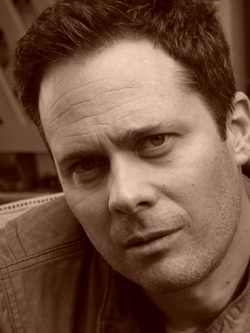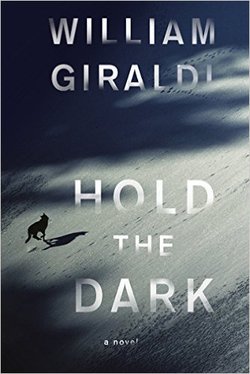William Giraldi is author of the novels Busy Monsters and Hold the Dark, which is now available in paperback. He's also a contributing editor for The New Republic and fiction editor for the journal AGNI at Boston University.
LK: I love Hold the Dark because I literally feel in the dark, shrouded by the dark, kept away from the light. This is what makes me want to go deeper and deeper into this book. It's like you get a little light at the end of each chapter and then you close the shades at the start of the next chapter. Talk about your use of light and dark to create tension throughout the text.
WG: That's a lovely observation and I'm very grateful for it. I see what you mean about that interplay of light and dark, although I wasn't necessarily conscious of that during composition. But I was conscious of something very similar: the interplay and dichotomies of nature and civilization, of sin and redemption, of sand and snow, of animal and man. Perhaps all of those fall under your classification of light and dark, and you're right: the tension between, the equipoise of those opposites is a necessary ballast of the plot. Also, in that part of Alaska in winter, the nights are very long, and so much of the novel must unfurl in darkness. There was no getting around that.
LK: Why wolves in Hold the Dark? Is it safe to say that Medora is a wolf? Why? Why not? Is it safe to say we are all wolves?
WG: Wolves are our most mythologized animals. We've made monsters of them but they're intensely dignified, intensely talented, master predators. Our ancestors learned much from watching their packs, and we recognized ourselves in those packs. Which might be part of why we found it necessary to exterminate them: we have the same impulse to exterminate each other. Medora is perhaps more the wolf than most are: she's out there at lip of the known world, in a relentless scape of death, of insistent and destructive weather, and she's trying to hold onto her humanness, not cross that line into the beastly, but it's hard when you don't have the strictures of civilization tamping the animal in you. On the other side of it, you and I and others like us, back here in the world: we have to contend with that tamping, society's will to snuff out all that's natural in us, to snap whatever nexus remains to our animal past. In a different context, in his poem "Inversnaid," Father Hopkins writes: "What would the world be, once bereft/ Of wet and of wildness? Let them be left,/ O let them be left, wildness and wet;/ Long live the weeds and the wilderness yet." All through Hold the Dark, Medora and Vernon Slone are walking wildernesses.
LK: You are intense in all the good ways. You're not wrapped up in the bullshit of the literary scene, which lately seems more like a vaudeville show. You're the real effing deal. Can you tell me about what attracts you to writing about violence and nature? What's our responsibility as writers to both? As human beings?
WG: That's very kind of you to say. Separating myself from the hurly-burly of the publishing business, from its online manifestation especially, is necessary for me or else I wouldn't get anything done. We've got only 80 good years, if we're lucky, and that's not enough time to read, to understand, all of the masterworks. Paradise Lost alone takes half a life. I just can't fathom wasting a solitary minute on Twitter or Facebook when Paradise Lost is waiting here. As for violence and nature: I suppose they are stereotypical masculine provinces, and my first novel was preoccupied with the masculine, and the memoir I'm finishing now is preoccupied with the masculine, so it makes sense that Hold the Dark would have those masculine concerns throbbing at its hub. Although, of course, you can argue that the most violent, most heinous act of the novel is committed by Medora, not by her husband. In other words: I'm uneasy with the simplistic formulations: men are violent, women are maternal. I think I'm attracted to the themes of violence and nature and masculinity because I'm eager to comprehend them, their destructiveness. That, I think, is a writer's duty to the perilous impulses of our species: to make stabs at comprehension, to mobilize the proper language in pursuit of that comprehension. That duty, I would argue, is the duty of all people, artists or not: not until we comprehend the destructiveness at our core -- and one of the characters in Hold the Dark is called Russell Core -- can we begin to mitigate it.
LK: You also have Busy Monsters out now. What was the difference in writing process like between this book and Hold the Dark?
WG: Busy Monsters was an exuberant romp of a book to write, while Hold the Dark was a painful slog. Some days, after six or seven hours at the keyboard, I'd have two sentences to show for it. Three if I was lucky. I had to learn how to breathe within the intensity of the material. We spend our lives looking away from evil and depravity and the heinousness we harbor, because we don't know how to fathom them. And I think my job in Hold the Dark was simply not to look away -- I'd argue that that's the job description of any storyteller, or any artist, actually: not to look away from what is worst in us.


